Related Research Articles

The Latin American Integration Association / Asociación Latinoamericana de Integración / Associação Latino-Americana de Integração is an international and regional scope organization. It was created on 12 August 1980 by the 1980 Montevideo Treaty, replacing the Latin American Free Trade Association (LAFTA/ALALC). Currently, it has 13 member countries, and any of the Latin American States may apply for accession.
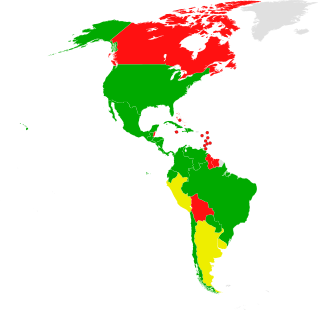
The Montevideo Convention on the Rights and Duties of States is a treaty signed at Montevideo, Uruguay, on December 26, 1933, during the Seventh International Conference of American States. The Convention codifies the declarative theory of statehood as accepted as part of customary international law. At the conference, United States President Franklin D. Roosevelt and Secretary of State Cordell Hull declared the Good Neighbor Policy, which opposed U.S. armed intervention in inter-American affairs. The convention was signed by 19 states. The acceptance of three of the signatories was subject to minor reservations. Those states were Brazil, Peru and the United States.
Conflict of laws is the set of rules or laws a jurisdiction applies to a case, transaction, or other occurrence that has connections to more than one jurisdiction. This body of law deals with three broad topics: jurisdiction, rules regarding when it is appropriate for a court to hear such a case; foreign judgments, dealing with the rules by which a court in one jurisdiction mandates compliance with a ruling of a court in another jurisdiction; and choice of law, which addresses the question of which substantive laws will be applied in such a case. These issues can arise in any private-law context, but they are especially prevalent in contract law and tort law.
The history of Uruguay comprises different periods: the pre-Columbian time or early history, the colonial period (1516–1811), the period of nation-building (1811–1830), and the history of Uruguay as an independent country.
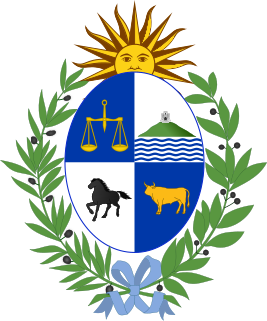
The politics of Uruguay abide by a presidential representative democratic republic, under which the President of Uruguay is both the head of state and the head of government, as well as a multiform party system. The president exercises executive power and legislative power and is vested in the two chambers of the General Assembly of Uruguay. The Judiciary is independent from that of the executive and legislature.

This article deals with the diplomatic affairs, foreign policy and international relations of Uruguay. At the political level, these matters are officially handled by the Ministry of Foreign Relations, also known as Cancillería, which answers to the President.
A territorial dispute or boundary dispute is a disagreement over the possession or control of land between two or more political entities.
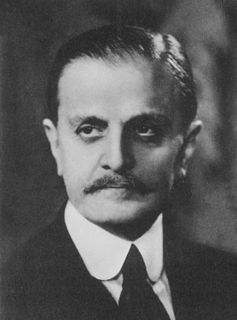
Carlos Saavedra Lamas was an Argentine academic and politician, and in 1936, the first Argentine Nobel Peace Prize recipient.
There have been several treaties signed in Montevideo such as:

Pan-Americanism is a movement that seeks to create, encourage, and organize relationships, associations and cooperation among the states of the Americas, through diplomatic, political, economic, and social means.
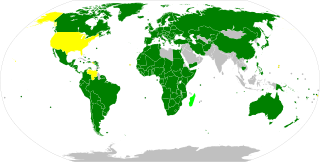
The Convention Relating to the Status of Refugees, also known as the 1951 Refugee Convention or the Geneva Convention of 28 July 1951, is a United Nations multilateral treaty that defines who a refugee is, and sets out the rights of individuals who are granted asylum and the responsibilities of nations that grant asylum. The Convention also sets out which people do not qualify as refugees, such as war criminals. The Convention also provides for some visa-free travel for holders of refugee travel documents issued under the convention.
The Conferences of American States, commonly referred to as the Pan-American Conferences, were meetings of the Pan-American Union, an international organization for cooperation on trade. James G. Blaine, a United States politician, Secretary of State and presidential contender, first proposed establishment of closer ties between the United States and its southern neighbors and proposed international conference. Blaine hoped that ties between the United States and its southern counterparts would open Latin American markets to US trade.

Colombia v Peru [1950] ICJ 6 is a public international law case, decided by the International Court of Justice. The ICJ recognised that the scope of Article 38 of the Statute of the International Court of Justice encompassed bi-lateral and regional international customary norms as well as general customary norms, in much the same way as it encompasses bilateral and multilateral treaties. The Court also clarified that for custom to be definitively proven, it must be continuously and uniformly executed.
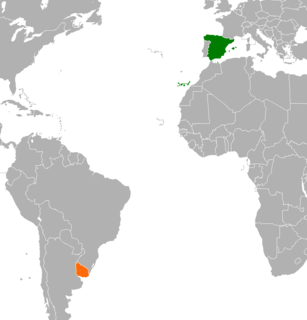
Spain–Uruguay refers to the current and historical relations between Spain and Uruguay. There is community of 67,000 Spanish nationals residing in Uruguay and 33,000 Uruguayan nationals residing in Spain. Both nations are members of the Association of Spanish Language Academies, Organization of Ibero-American States and the United Nations.
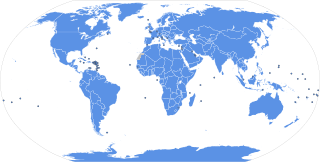
A sovereign state is a political entity that is represented by one centralized government that has sovereignty over a geographic area. International law defines sovereign states as having a permanent population, defined territory, one government and the capacity to enter into relations with other sovereign states. It is also normally understood that a sovereign state is independent. According to the declarative theory of statehood, a sovereign state can exist without being recognised by other sovereign states. Unrecognised states will often find it difficult to exercise full treaty-making powers or engage in diplomatic relations with other sovereign states.

Asylum in the European Union (EU) has its roots in the 1951 Convention Relating to the Status of Refugees, an agreement founded on Article 14 of the Universal Declaration of Human Rights. Following the adoption of the Schengen Agreement on the elimination of internal border controls of signatory states and its subsequent incorporation into the EU legislative framework by the Amsterdam Treaty, the EU set up a Common European Asylum System (CEAS) to unify minimum standards related to asylum, leaving up to EU Member States the discretion to establish procedures for obtaining and withdrawing international protection.
The First South American Congress of Private International Law was an international congress on private international law and an ad-hoc codifier forum of international conflict of laws treaties held in Montevideo from 25 August 1888 to 18 February 1889, in which eight treaties and an additional protocol were passed that covered practically all the subjects of conflicts of laws of that time. These were one of the first treaties on conflict of laws to come into force in the world.

Margarita Argúas was an Argentine lawyer who pioneered participation of women into the legal profession. She was the first woman to hold a chair in the law faculty at the University of Buenos Aires, first woman to be appointed to the National Academy of Law and Social Sciences, as well as the first woman to serve on the Argentine Supreme Court of Justice of the Nation. Internationally, she was the first woman to become president of the International Law Association, serving from 1968 to 1970 and was a member of the Permanent Court of Arbitration in The Hague between 1977 and 1983. She was posthumously honored with a Konex Foundation award in 1986 for her work in Civil and International Law.
The Convention on the Exercise of Liberal Professions of 1939 is a treaty signed in the Second South American Congress of Private International Law of 1939 and 1940 in Montevideo, by which allows holders of an academic degree obtained in a public education institution of a state party to validate their degrees in another state party provided that the degree keeps a reasonable equivalence with the corresponding one in the second state. This treaty updates the provisions of the Convention on the Exercise of Liberal Professions of 1889, and binds Argentina, Paraguay and Uruguay.
The Convention on the Exercise of Liberal Professions of 1889 is a treaty signed in the First South American Congress of Private International Law of 1889 in Montevideo, by which allows holders of an academic degree obtained in a public education institution of a state party to automatically validate their degrees in another state party without any requirement other than displaying the degree and prove that its owner is the one who is asking the validation. This treaty binds Argentina, Bolivia, Colombia, Ecuador, Paraguay, Peru and Uruguay.